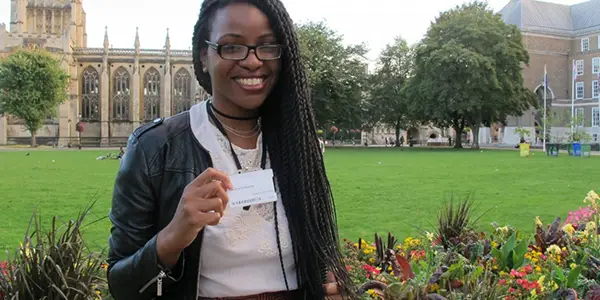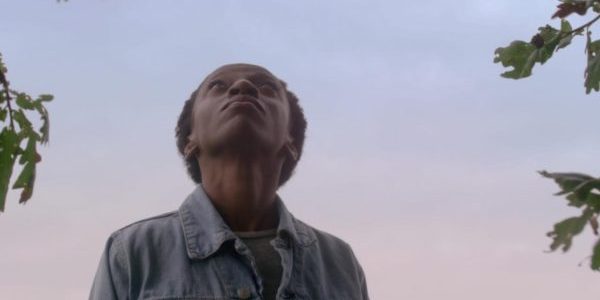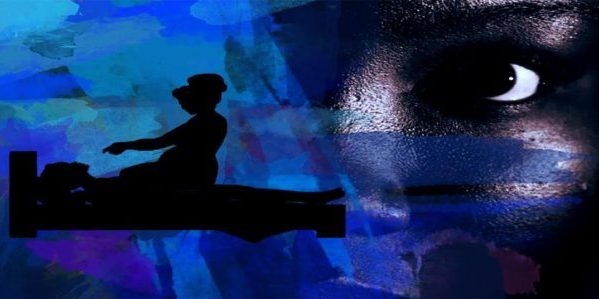Interview With Director Candice Onyeama, On Mental Health & Identity In Film

We caught up with , founder of Genesis Child Productions, about her short film HUSH which focuses on a young girl Uche, played by Keziah Joseph. Uche loses her ability to speak, which has a ripple effect on her entire family.
Her mutism provokes every emotion you can imagine from her family, and each member reacts in a completely different way. Despite Uche’s silence being the center of the film, HUSH gives insight into each of the character’s internal battles. In under 15 minutes, the extraordinary short film touches on a whole host of themes.
Firstly, can you tell us a bit more about you and how Genesis Child Productions started?
Candice Onyeama: I’m a British Nigerian filmmaker. I actually started out on my creative journey solely as an actress, with guest roles in TV series like the BBC’s Doctors and Silent Witness. But although I enjoy acting, I felt limited in the roles I was playing and also wanted to tell my own stories, so with the support of Ideastap I wrote my first screenplay HUSH.

The film was really personal to me and I decided I wanted greater involvement in its production, so I took on the role of producer and set up the company Genesis Child Productions to make it and that’s really how it all got started. I envision the company as a home not just for my own films but for stories by other women of African descent in future.
There are many charities and campaigns working hard to encourage more open conversations around mental health and remove the stigma that has been attached for so many years. Is this where the inspiration for HUSH came from?
Candice Onyeama: I wish I could say yes but to be honest, it was only after HUSH and the connections I started making that I found out more about these inspirational organisations such as Unmasked by Nicole Crentsil that raises awareness about mental health issues within the Black British community.
The inspiration for HUSH actually came from a short piece of writing I did when I was still at drama school. I’d had a difficult time at the school for a host of reasons and I found where I had once been a really confident and outspoken young person, I started to feel my voice go and became really nervous about voicing my opinions.

I wrote a piece imagining what it would be like to ‘retreat from the land of the speaking forever’ (which luckily I didn’t!). My confidence eventually came back but that was the genesis of the HUSH the film. I later did more research on mutism, which quite a few children suffer with and which Maya Angelou herself experienced following her rape as a child as a way of dealing with the trauma. All this informed the development of the story.
Despite the film being just 14 minutes long, you touch on a whole host of issues from racism, religion, mental health from a range of perspectives. When writing the film, how did you hope to connect with your audience?
Candice Onyeama: It’s interesting because its only since audiences have been watching and giving feedback about all the various themes they connected with that I realise how vast they are. To be honest what I really wanted people to connect with when watching were the characters especially Uche. Fleshing them out and making people empathize with all their internal battles which comes to a head with Uche’s emotional break down and mutism was what I wanted to come across.
It was really important to me that no character in the family was seen as villain because to me they are all individuals caught up in the isolation of their internal battles. That’s what I wanted to capture, the loneliness of mental illness and depression even when surrounded by so many people and a big family. But also, the healing power that being there, present and connected to someone battling mental health can have – which is represented at the end of the film when the family finally all come together.
There are many references to the importance religion holds in Uche’s family, especially to her mother. It could almost be interpreted as an obstacle between Uche and her mother’s affection. Could you talk a bit more about the references to religion in the film?
Candice Onyeama: Yes, this was partly inspired by personal experiences, not from my mum but more from my grandma who was Catholic and very religious. It’s also something I think you come across in a lot of African households where religion and the church can hold strong sway.

In many cases (though by no means all), the Church becomes the one stop shop for all problems, which can make it hard to have deep and human discussions about mental health issues or anxieties in families. You’re told to simply ‘pray about it’ or your problem is seen as being an attack by the devil for the pastor and members of the church to pray about and cast out.
This can make it difficult for a vulnerable young person to feel they can open up honestly to a parent without the sole advice and comfort offered being instructions to seek divine intervention. Luckily my mum never imposed any religious belief on me growing up and really let me decide my own faith path but that’s something which is extremely rare in most African households.
Is HUSH a project you plan on revisiting in the future as a feature?
Candice Onyeama: I feel that HUSH was a really complete story in its own right so I don’t know if I could really explore the story much further as a feature. But never say never I guess and I might return to it in a longer form in future, even though I’d envision this as more of an episodic series exploring each of the character’s backstories maybe like the French series The Returned. Hmm you’ve got me thinking seriously about this now!
Have you got anymore projects in store for us?
Candice Onyeama: Yes, I’m currently working on a short supernatural drama that deals with identity in diaspora called Once an Old Lady Sat On My Chest. I put the story forward at the Encounters Film Festival for their Widening the Lens pitching competition where it won 2nd prize last year.
It’s a film I’m really excited about making as it deals with themes that I’m very passionate about. We have just finished crowdfunding, thank you to all those who supported!
Despite Once an Old Lady Sat On My Chest still in the pre-production stages, it has already gained the medias attention, and highlighted by the Metro as one of the top films to support through crowdfunding. To learn more about the film, check out the campaign video.
HUSH is currently circulating the festival circuit, screening internationally including at London’s British Urban Film Festival, NFFTY in Seattle and the Women of African Descent Film Festival in New York. Be sure to check out the trailer!
To keep up to date with where HUSH will next be screening be sure to follow Genesis Child Productions on Twitter and Facebook, as well as updates on Once an Old Lady Sat On My Chest.
https://vimeo.com/174120493
Does content like this matter to you?
Become a Member and support film journalism. Unlock access to all of Film Inquiry`s great articles. Join a community of like-minded readers who are passionate about cinema - get access to our private members Network, give back to independent filmmakers, and more.













